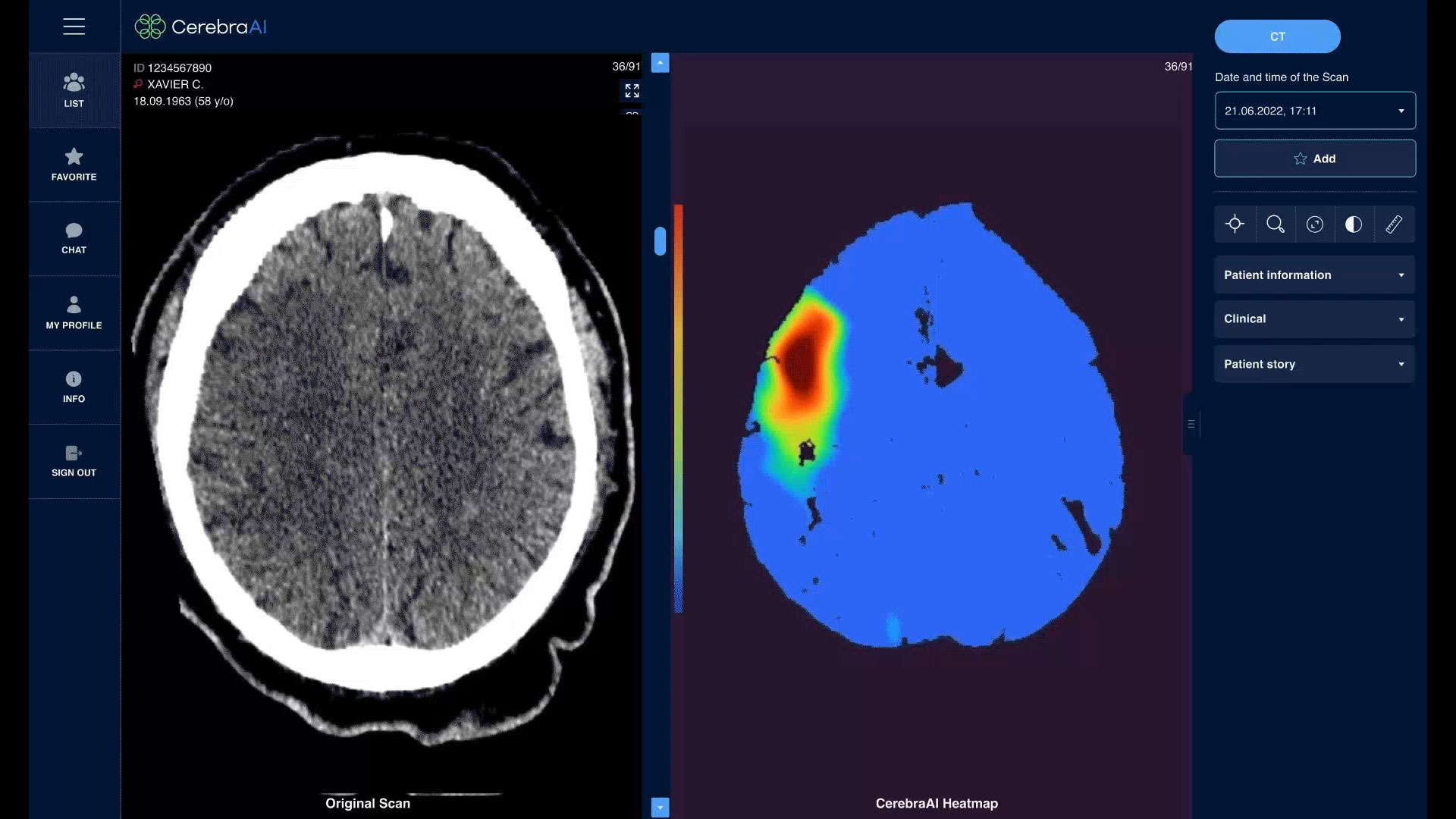- CerebraAI is developing the first neuroradiology analysis map using personalized AI-generated images of the patient’s pseudo-healthy brain to enhance non-contrast CT scans for accelerated triage and treatment of ischemic stroke victims
- Less than 20% of stroke patients in the U.S. receive treatment primarily due to hospitals not being equipped for acute ischemic stroke detection; left undiagnosed, results typically lead to a high risk of long-term disability or death
- With more than 130,000 patients analyzed in Kazakhstan, the deep learning AI model is being developed to predict personalized “norms” in brain imaging
PALO ALTO, Calif.–(BUSINESS WIRE)–#AI—CerebraAI, an AI-driven neuroradiology software company focused on acute ischemic stroke detection, has relocated its headquarters to the U.S. from Kazakhstan, joining the new vibrant community of Central Eurasia tech startups at the Silkroad Innovation Hub in Silicon Valley. The company is developing a brain imaging analysis map with a novel approach of using personalized AI-generated images of the patient’s pseudo-healthy brain to enhance non-contrast CT (NCCT) scans intended for physicians to rapidly diagnose ischemic stroke.

Stroke is a leading cause of death and long-term disability in the U.S. and globally. Only 20% of stroke victims receive treatment primarily due to the lack of neuroradiologists and the majority of hospitals not being equipped for acute ischemic stroke detection, accounting for 87% of all strokes.1 Non-contrast CT scans, readily available in 94% of the approximately 5000 hospital emergency departments in the U.S., are the standard of care for diagnosing potential stroke patients but are much easier for hemorrhagic stroke detection, only 13% of all strokes. NCCT has very low sensitivity to ischemic stroke and only highly trained neuroradiologists can typically diagnose it with accuracy comparable to advanced imaging methods, such as computed tomography angiography (CTA), CT perfusion (CTP), and magnetic resonance imaging (MRI) which are available in a relatively small number of comprehensive stroke units in the U.S. With an extremely short window for stroke treatment of four and a half hours from incident time, CerebraAI is developing its AI-powered software to address one of the greatest diagnostic gaps in emergency care, the ability of the human eye to detect ischemic strokes in NCCT scans.
“CerebraAI’s mission is to enhance existing hardware in hospital emergency departments without capital investment by unlocking the full potential of non-contrast CT brain imaging with a technology that is as sensitive as an MRI in detecting acute ischemic strokes,” stated Doszhan Zhussupov, Founder and CEO of CerebraAI. “There are a number of AI solutions being introduced in radiology as supplementary tools for CTA/CTP or MRI, though these modalities are already quite efficient without AI support. We are working to create AI algorithms that substantially increase the efficiency of readily available NCCTs to help hospitals and physicians get maximum utility out of this modality for improved patient outcomes.”
Ischemic stroke results in a decrease in brain tissue density. CerebraAI’s algorithm is being developed to analyze NCCT brain scans and detect these tissue abnormalities. Following algorithm training and extensive studies in Kazakhstan, with over 130,000 patients analyzed, development is currently underway to introduce CerebraAI’s medical imaging software to the U.S. market.
As part of CerebraAI’s U.S. market entry, the company has joined other leading entrepreneurs who have relocated from Central Eurasia to Silicon Valley at the Silkroad Innovation Hub. The Great Silk Road has a rich and adventurous history of linking Central Asia to the West. For centuries, tradesmen from the Far East traversed the Silk Road network transporting, among other things, some valuable ideas. The new Silkroad Innovation Hub takes this legacy forward by creating professional inroads for entrepreneurs, founders, startups, and talented individuals from Central Asia, Turkey, Azerbaijan, and Mongolia straight into Silicon Valley. The startup ecosystem supports Central Eurasian entrepreneurs in discovering avenues to establish or expand their ventures in Silicon Valley and the U.S. market through valuable industry insights, targeted training and collaboration, networking opportunities, and mentorship.
“We are excited to welcome CerebraAI to the U.S. and hope for them to pave the way for a new wave of future unicorns from Central Eurasia,” said Asror Arabjanov, Silkroad Innovation Hub co-founder. “CerebraAI is one of the first deep tech AI startups in Kazakhstan and they are making a meaningful difference in serving humanity with their novel approach to acute ischemic stroke detection. They are pioneering a new future in emergency care medical imaging diagnostics.”
About CerebraAI
Founded in 2018, CerebraAI is developing medical imaging software for acute ischemic stroke detection through the power of generative AI. Pioneering the development of personalized AI-generated images of the patient’s pseudo-healthy brain based on non-contrast CT (NCCT) scans, CerebraAI aims to leverage its brain imaging algorithm to detect tissue abnormalities through a detailed analysis map for accelerated diagnosis, triage, and treatment of acute ischemic stroke victims. The software is being designed for use on a mobile app or web-based platform. Currently in use in 47 hospitals in Kazakhstan and two Uzbekistan hospitals, with more than 130,000 patients analyzed, CerebraAI’s medical imaging software is not yet approved in the U.S. The company recently relocated its headquarters from Kazakhstan to Silicon Valley for this continued U.S. product development, in addition to expansion plans in multiple markets globally.
In 2022, StartUs Insights ranked CerebraAI’s deep learning model among the top five global projects for diagnosing brain diseases. In addition to being a part of the new Silkroad Innovation Hub, CerebraAI is the first startup from Central Asia to be accepted into the highly-vetted community of Stanford alumni and professor founders at StartX and recently joined UC Berkeley’s Health Engine Accelerator, working with industry leaders and renowned researchers. CerebraAI is also honored to be a part of the Microsoft for Startups Founders Hub, NVIDIA Inception Program, and MedTech Innovators startup ecosystems and has received global recognition, including Intel Software’s AI Startup Olympics grand prize, Johnson & Johnson Impact Ventures’ HealthTech Startups in APAC top award, EY’s Best Innovative Startup honor, Medtronic’s Top 10 Most Innovative Medical AI Startups in APAC in 2022, HealthUnity’s Generative AI Startup Challenge Digital Health winner, the Digital Almaty Best MedTech Award, Global Startup Awards’ Best VerTech Startup, the Global Health Exhibition Innov8 Competition winner, the TechCrunch Startup Battlefield 200 2023, and the LEAP 2024 Artificial Intelligence Award. For more information, please visit www.CerebraAI.ai and follow us on LinkedIn.
References:
1 Oravec CS, Tschoe C, Fargen KM, et al. Trends in mechanical thrombectomy and decompressive hemicraniectomy for stroke: A multicenter study. The Neuroradiology Journal. 2022;35(2):170-176.doi:10.1177/19714009211030526
Contacts
Laurie Peters
CerebraAI
laurie@cerebraai.ai
(818) 635-4101


